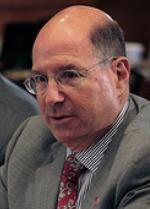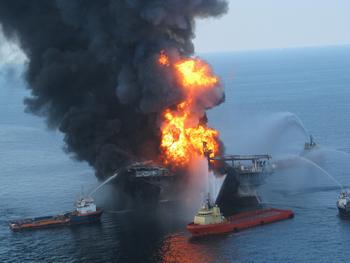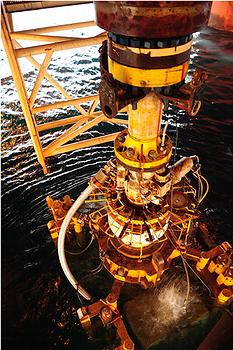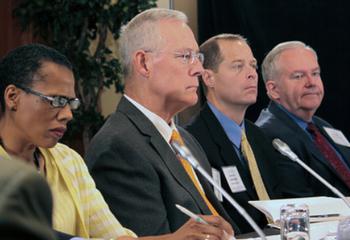Deepwater Horizon Spill Report Blames BP, Contractors, Government
WASHINGTON, DC, November 17, 2010 (ENS) - Lack of a systematic approach to well safety, numerous flawed decisions, plus technical and operational breakdowns all contributed to the Deepwater Horizon oil rig explosion and massive spill from BP's Macondo well in the Gulf of Mexico, says a scientific committee of the National Academy of Engineering and National Research Council in a report released today.
 |
Donald Winter chairs a committee hearing, August 13, 2010 (Photo courtesy National Academy of Sciences) |
"Important decisions made to proceed toward well abandonment despite several indications of potential hazard suggest an insufficient consideration of risks," said Donald Winter, former secretary of the Navy, professor of engineering practice at the University of Michigan, and chair of the 15-member study committee.
"It's also important to note that these flawed decisions were not identified or corrected by BP and its service contractors, or by the oversight process employed by the U.S. Minerals Management Service and other regulatory agencies," said Winter.
The committee was convened at the request of Secretary of the Interior Ken Salazar to conduct an independent and science-based investigation into the root causes of the Deepwater Horizon oil spill that amounted to 4.9 million barrels before the well was capped on July 19. The oil spread across a vast expanse of the gulf, causing widespread fisheries closures and fouling hundreds of miles of shoreline and wetlands.
Eleven crew members died and 17 others were hurt in the initial explosion April 20 at a site 40 miles southeast of the Mississippi Delta.
"It may not be possible to definitively establish which mechanisms caused the blowout and explosion, given the deaths of 11 witnesses on board, the loss of the oil rig and important records, and the difficulty in obtaining reliable forensics information from the Macondo well," the committee says in its peer-reviewed report.
 |
Response vessels shoot water onto the blazing Deepwater Horizon oil rig, which sank in the Gulf of Mexico April 22, 2010. (Photo courtesy U.S. Coast Guard) |
Nevertheless, the committee said it has been able to develop "a good understanding" of a number of key factors and decisions that may have contributed to the blowout of the well."
On the issue of safety vs saving money, the committee's report contradicts last week's assertions of the presidential commission investigating the disaster that there is, "No evidence at this time to suggest that there was a conscious decision to sacrifice safety concerns to save money."
Citing testimony given at the Marine Board of Inquiry hearing into the disaster on July 22 by BP Wells Team Leader John Guide, the committee states, "many of the pivotal choices made for the drilling operation and temporary abandonment of the well were likely to result in less cost and less time relative to other options..."
Decisions that contributed to the accident began with continuing abandonment operations at the Macondo site despite several tests that indicated that the cement put in place after the installation of a long-string production casing was not an effective barrier to prevent gases from entering the well, the committee said.
"The decision to accept the test results as satisfactory without review by adequately trained shore-based engineering or management personnel suggests a lack of discipline and clearly defined responsibilities," the committee reported.
"In addition, several clear failures in monitoring of the well appear to have contributed to its blowout; available data show hydrocarbons entered the well undetected for almost an hour before the first explosion."
"Timely and aggressive action to control the well was not taken, and for unknown reasons, hydrocarbons were funneled through equipment that vented them directly above the rig floor rather than overboard. These conditions made ignition "most likely," the report says.
 |
The 50-foot, 300-ton Deepwater Horizon blowout preventer was raised from the damaged wellhead, September 4, 2010. (Photo courtesy U.S. Coast Guard) |
Finally, the blowout preventer did not seal the well once activated.
Of particular concern, the committee said, is the "lack of a systems approach to integrate the multiple factors impacting well safety, to monitor the overall margins of safety, and to assess various decisions from a well integrity and safety perspective."
The report also notes that a previous loss of hydrocarbon circulation in the Macondo well on March 8, more than a month before the accident, presented an opportunity to take actions to mitigate future risks.
The committee pointed to three questionable decisions that were made about the cementing process prior to the accident:
- attempting to cement across multiple hydrocarbon and brine zones
in the deepest part of the well in a single operational step, making
a hydraulic fracture in a low-pressure zone more likely
- using a long-string production casing instead of a liner over
the uncased section of the well
- deciding that only six centralizers were needed to ensure an even spacing between the formation rock and the casing, even though modeling results suggested that more centralizers would have been necessary
The federal government came in for a share of blame in the committee's report, particularly the Minerals Management Service, MMS, which the committee found "did not have a formal training and certification program for its inspectors." MMS was responsible for review and approval of permits and plan for the drilling and completion of the Macondo well.
Federal agencies lacked information about what other agencies were doing, the committee found.
As the flag state of the Deepwater Horizon, the Republic of the Marshall Islands was responsible for conducting safety inspections and surveys and monitoring compliance with national and international safety standards.
The American Bureau of Shipping and Det Norske Veritas, two classification societies, conducted surveys and audits required for issuance of certificates on behalf of the Marshall Islands.
The U.S. Coast Guard had responsibility for ensuring the Deepwater Horizon met the safety requirements for rigs operating in the U.S. Outer Continental Shelf Region.
"From testimony," wrote Winter in the committee's report, "it appears that the various organizations mentioned above sometimes were not certain of the oversight duties actually being carried out by other organizations."
The testimony he cites was given at the Marine Board of Inquiry hearing into the incident on May 12, by Capt. Thomas Heinan, deputy commissioner maritime affairs, Marshall Islands; and the May 26 testimony of John Forsyth, assistant chief surveyor, American Bureau of Shipping.
 |
Four of the 15 committee members: Jocelyn Scott, Paul Bommer, David Hoffman, and Roger McCarthy during a hearing August 12, 2010. (Photo courtesy National Academy of Sciences) |
BP and the contractor companies offered no immediate comment on the interim report.
For its final report, due in the summer of 2011, the committee will examine ways to establish practices and standards to foster a culture of safety and methods to ensure that schedule and cost decisions do not compromise safety.
The committee will assess the extent to which there are gaps, redundancies, and uncertainties in responsibilities of multiple agencies and professional societies overseeing deepwater drilling operations, and it will consider the merits of an independent technical review to provide operation checks and balances by enforcing standards and reviewing deviations.
The Macondo well's blowout preventer was only recently recovered and is undergoing forensic analyses. The committee will evaluate possible causes for the failure of the blowout preventer once key data are made available.
Secretary Salazar said today that the committee's "independent, science-based analysis of what went wrong in the lead up to the blowout will help guide our continuing efforts to raise the bar for safety and oversight of offshore oil and gas operations, and will be of assistance to other ongoing investigations."
Michael Bromwich, director of the department's Bureau of Ocean Management, Regulation and Enforcement, the agency that took over the functions of the discredited and disbanded Minerals Management Service, said,
The work of the NAE and NRC team "will help guide our continuing efforts to strengthen standards and oversight and underscores the importance of our ongoing efforts to build a strong and independent agency with the resources, training, and expertise to provide aggressive oversight of offshore oil and gas operations to ensure that offshore energy production is conducted "in a manner that protects human life and the environment."
NATIONAL ACADEMY OF ENGINEERING
|
Copyright Environment News Service (ENS) 2010. All rights reserved.
To subscribe or visit go to: http://www.ens-newswire.com